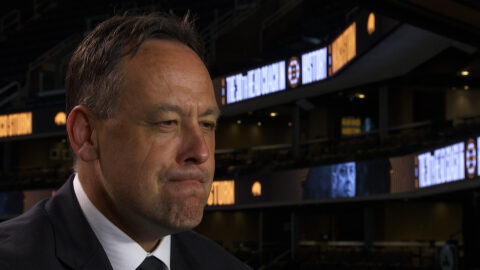 BOSTON — It wasn’t the five walks or the eight hits or the 114 pitches he threw in five mostly disastrous innings that cost Clay Buchholz and the Red Sox the game Sunday.
BOSTON — It wasn’t the five walks or the eight hits or the 114 pitches he threw in five mostly disastrous innings that cost Clay Buchholz and the Red Sox the game Sunday.
It wasn’t any of those things individually. It was all of them, together, and then some, to the extent Buchholz did not even try to narrow down the list of what went wrong in the 8-7 defeat at the hands of the New York Yankees.
“Everything,” Buchholz said. “Command. Didn’t have feel for much of anything. Second start in a row where walks were a killer.”
Buchholz had many opportunities to set things right Sunday. He was spotted two three-run leads and cruised through the heart of New York’s order in a 1-2-3 third inning. After a two-run home run by David Ortiz pushed Boston’s advantage to 7-4, Buchholz came out and retired Jacoby Ellsbury and Mark Teixeira to begin the fifth inning — then let the next four batters reach base, surrendering three runs in the process.
Red Sox manager John Farrell put forth some theories about why Buchholz has been roughed up for at least five runs in each of his last three starts, but he essentially came to the same conclusion as his now-ace: It’s not one thing. It’s everything.
“I think there’s maybe a little bit of a tendency to pitch a little bit too fine that’s caused him to fall behind in the count,” Farrell said. “Mechanically, he may be running away from his arm a little bit where it’s causing him to miss to the arm side, but it’s still overall pitch mix and command.”
Buchholz, whose record fell to 5-7 with a 6.30 earned run average, sounded close to defeated. He admitted the loss of mentors Jon Lester and John Lackey has created more responsibility for him atop the rotation, but insisted the pressure was not affecting his performance. He was asked if this was a start he just feels he needs to put behind him.
“I’ve felt like that a lot this year,” Buchholz said. “It’s been a frustrating year for me individually and obviously for the organization. It’s not the way we want to go out there and wear the Red Sox uniform on any given night. A lot of that’s on my shoulders, not picking up the weight I need to pick up during the season.”
Sunday’s performance was eerily similar to one that took place on the same mound just one day before, when a Boston pitcher lost his command and with it his grip on the game. Only then, it was 24-year-old Allen Webster, who was making his 10th career major-league start, not a 29-year-old All-Star with a no-hitter on his resume. When things started to go bad, Buchholz, like Webster, began to focus on the ugly digits on the scoreboard rather than simply executing the next pitch.
“I know you’re not supposed to look up at the board and see the numbers, but everybody sees it,” Buchholz said. “It’s a constant battle, going out there, trying to throw up zeroes, and when it doesn’t happen it just gets more frustrating. It’s part of the game. That’s why the game’s hard. You’ve got to find a way to get through it.”
Now, Buchholz must find a way through his struggles, as he was unable to Sunday. At the very least, he knows where to start. Step 1: Fix everything.



